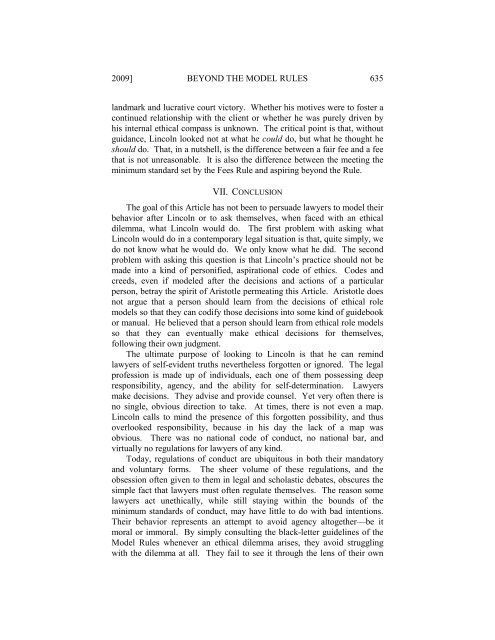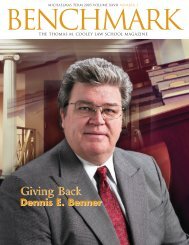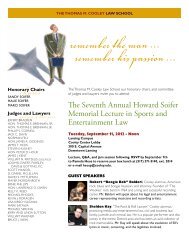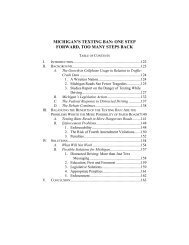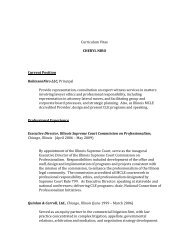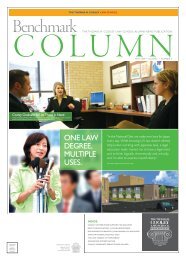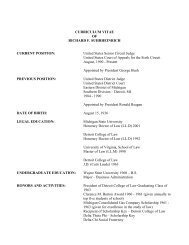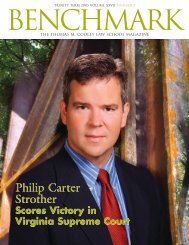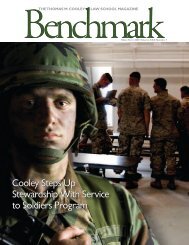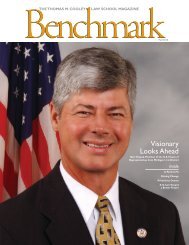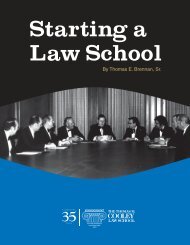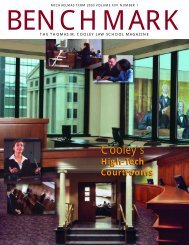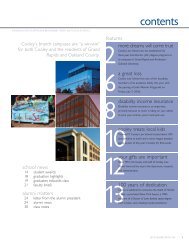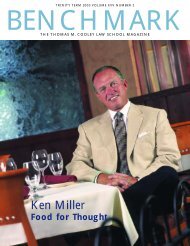Beyond The Model Rules - Thomas M. Cooley Law School
Beyond The Model Rules - Thomas M. Cooley Law School
Beyond The Model Rules - Thomas M. Cooley Law School
Create successful ePaper yourself
Turn your PDF publications into a flip-book with our unique Google optimized e-Paper software.
2009] BEYOND THE MODEL RULES 635landmark and lucrative court victory. Whether his motives were to foster acontinued relationship with the client or whether he was purely driven byhis internal ethical compass is unknown. <strong>The</strong> critical point is that, withoutguidance, Lincoln looked not at what he could do, but what he thought heshould do. That, in a nutshell, is the difference between a fair fee and a feethat is not unreasonable. It is also the difference between the meeting theminimum standard set by the Fees Rule and aspiring beyond the Rule.VII. CONCLUSION<strong>The</strong> goal of this Article has not been to persuade lawyers to model theirbehavior after Lincoln or to ask themselves, when faced with an ethicaldilemma, what Lincoln would do. <strong>The</strong> first problem with asking whatLincoln would do in a contemporary legal situation is that, quite simply, wedo not know what he would do. We only know what he did. <strong>The</strong> secondproblem with asking this question is that Lincoln’s practice should not bemade into a kind of personified, aspirational code of ethics. Codes andcreeds, even if modeled after the decisions and actions of a particularperson, betray the spirit of Aristotle permeating this Article. Aristotle doesnot argue that a person should learn from the decisions of ethical rolemodels so that they can codify those decisions into some kind of guidebookor manual. He believed that a person should learn from ethical role modelsso that they can eventually make ethical decisions for themselves,following their own judgment.<strong>The</strong> ultimate purpose of looking to Lincoln is that he can remindlawyers of self-evident truths nevertheless forgotten or ignored. <strong>The</strong> legalprofession is made up of individuals, each one of them possessing deepresponsibility, agency, and the ability for self-determination. <strong>Law</strong>yersmake decisions. <strong>The</strong>y advise and provide counsel. Yet very often there isno single, obvious direction to take. At times, there is not even a map.Lincoln calls to mind the presence of this forgotten possibility, and thusoverlooked responsibility, because in his day the lack of a map wasobvious. <strong>The</strong>re was no national code of conduct, no national bar, andvirtually no regulations for lawyers of any kind.Today, regulations of conduct are ubiquitous in both their mandatoryand voluntary forms. <strong>The</strong> sheer volume of these regulations, and theobsession often given to them in legal and scholastic debates, obscures thesimple fact that lawyers must often regulate themselves. <strong>The</strong> reason somelawyers act unethically, while still staying within the bounds of theminimum standards of conduct, may have little to do with bad intentions.<strong>The</strong>ir behavior represents an attempt to avoid agency altogether—be itmoral or immoral. By simply consulting the black-letter guidelines of the<strong>Model</strong> <strong>Rules</strong> whenever an ethical dilemma arises, they avoid strugglingwith the dilemma at all. <strong>The</strong>y fail to see it through the lens of their own


